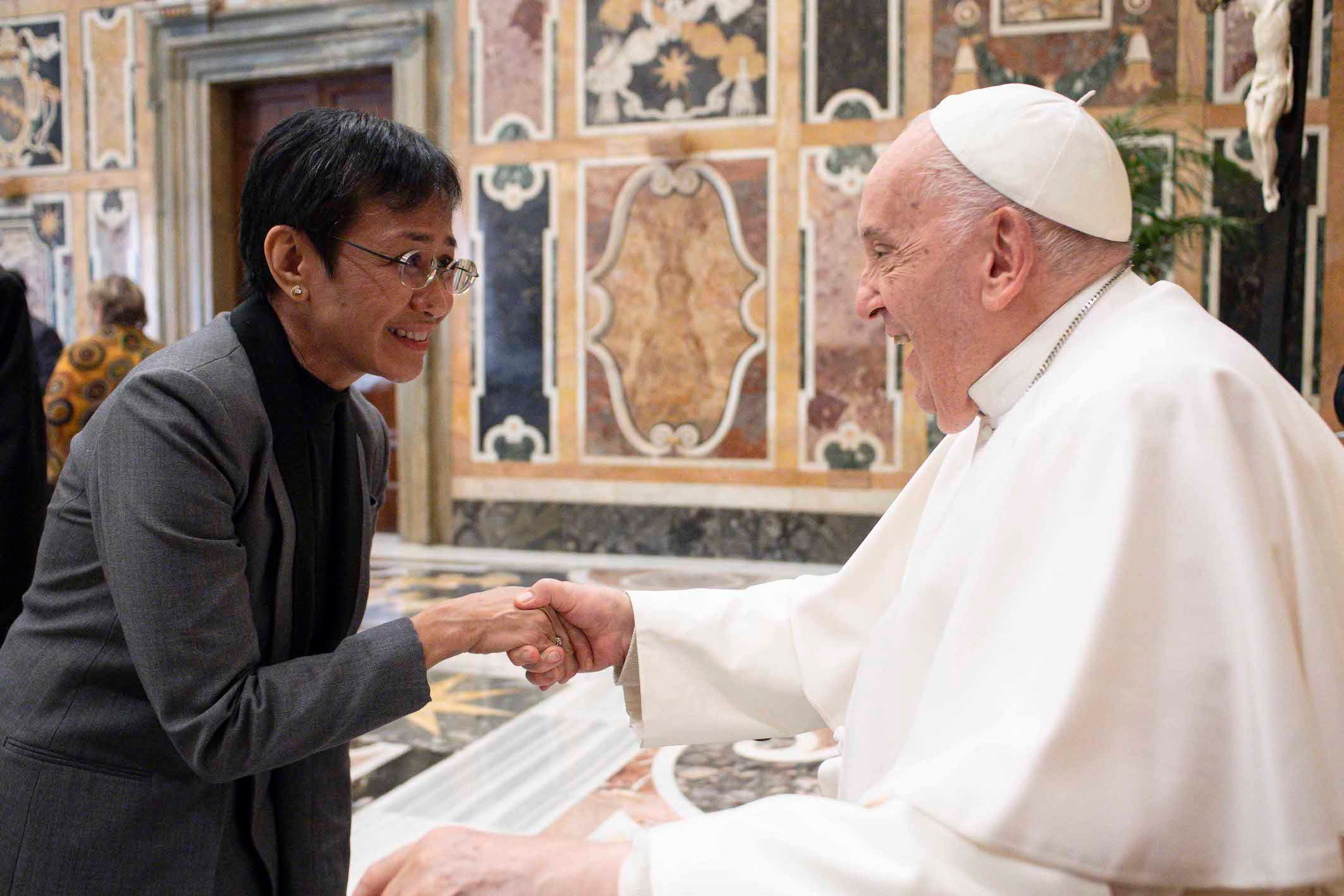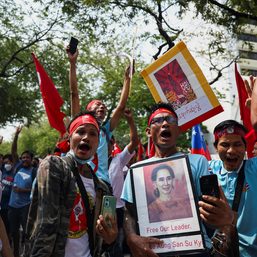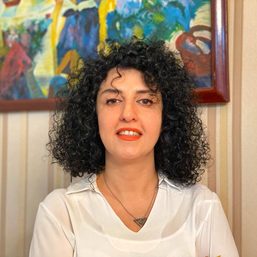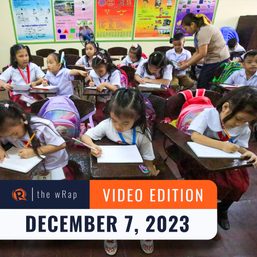SUMMARY
This is AI generated summarization, which may have errors. For context, always refer to the full article.

VATICAN CITY – “Pope Francis, we’re praying for you in the Philippines.”
The brief exchange between Pope Francis and Maria Ressa, the first Nobel Peace Prize laureate from the Philippines, centered on the Southeast Asian country as they met for the second time on Saturday, May 11.
The first time was on December 6, 2023, when Ressa and fellow Nobel Peace Prize laureate Tawakkol Karman of Yemen presented to Francis a landmark declaration on human fraternity. This initial meeting took place at the 6,300-seater Pope Paul VI Hall, where the pontiff holds his weekly general audiences when it is cold or rainy.
A more intimate meeting took place on Saturday at the Apostolic Palace, the official residence of popes through the centuries, even as the Argentine pontiff has lived at the relatively plain Vatican guesthouse called Casa Santa Marta for the past 11 years.
Ressa was among around 350 participants of the second World Meeting on Human Fraternity – composed of Nobel Peace Prize laureates and other peace advocates – who gathered at the Clementine Hall of the Apostolic Palace for a private audience with Francis at around 10:30 am in Rome (4:30 pm in Manila).
Responding to Ressa’s promise of prayers from Filipinos, the Pope responded, “I need it, thank you!” Then, the Rappler CEO answered, “Please pray for us.”
Ressa, who received the Nobel Peace Prize in 2021, also handed Francis a private letter in a white envelope. A 60-year-old former CNN bureau chief and former news head of ABS-CBN, Ressa is known as one of the world’s staunchest defenders of press freedom.

Like Ressa, other Nobel Peace Prize laureates, representatives of Nobel-winning organizations, and human rights activists lined up to greet Francis at the Clementine Hall on Saturday, following brief remarks by the leader of the Catholic Church.
Built in the 16th century, the Clementine Hall is a reception room adorned by Renaissance frescoes from its ceiling to its walls, where the Pope receives dignitaries and other guests for private audiences.
The participants of the second World Meeting on Human Fraternity, in their exchanges with Francis, sought his help to end war and build peace in a world also plagued by hunger, inequality, and violence brought about by new technology.
The 87-year-old Pope, who is known for his closeness to people, chatted with each of the 350 guests one by one with almost no time limit – although the guests would be the ones to limit their interactions to a few seconds or half a minute at most, out of courtesy.
Presenting a peace declaration
In a symbolic move, the first to approach the Pope on Saturday were Nobel Peace Prize recipients from two warring countries, Russia and Ukraine.
The two Nobel Peace Prize recipients were Russian journalist Dmitry Muratov, who received the award along with Ressa in 2021, and Oleksandra Matviichuk, head of the Center for Civil Liberties, which was handed the Nobel in 2022 for defending Ukraine.
Muratov and Matviichuk handed the Pope a copy of the peace declaration crafted during the two-day World Meeting on Human Fraternity convened by the Vatican to forge closer brotherhood and sisterhood among different people.
Nobel Peace Prize laureates and other peace advocates had deliberated on this declaration during a high-level meeting opened by the Vatican’s Secretary of State, Cardinal Pietro Parolin, in Rome on Friday, May 10.
The drafting session was held for more than six hours, with only an hour-long lunch in between, at the 15th-century Palazzo della Cancellaria in Rome. This Renaissance palace is, like Clementine Hall, covered by frescoes that depict the power and majesty of the Catholic Church – a 2,000-year-old institution that has both stoked conflict and promoted peace in different points in history.
The product of in-depth research, open dialogue, and at times heated arguments over big ideas or technical terms, their statement called for peace in war-torn Ukraine and Gaza, and other parts of the globe.
“We appeal to the Holy Father for his prayers for a ceasefire. We are calling for a ceasefire for all during the Olympic Games, particularly in Ukraine and Gaza,” said the version of the statement that was presented to Francis on Saturday.
Peace, they pointed out, “is not merely the absence of war,” but is fraternity and social justice, among other things.
“We cannot achieve global peace without ensuring justice and respect for human rights for all including those of refugees and migrants,” the signatories said. “Peace is nurtured by the culture of fraternity, ensures true equality between women and men, fairly redistributes wealth, dignifies work and provides access to the education and healthcare.”
The declaration also touched on technology. Peace, it said, “is about unleashing human ingenuity and creativity while controlling the negative aspects of artificial intelligence, which not only manipulates information but also hijacks our emotions, pumping toxic sludge into our public information ecosystem.”
“Online violence translates to real-world violence, especially when artificial intelligence is used in weapons to target and kill without human oversight. We must stop the impunity of countries and companies in this regard,” the declaration said.
‘He held my hand tight’
The Nobel Peace Prize recipients and their representatives echoed this peace declaration in their own exchanges with Francis on Saturday.
Karman, a 45-year-old Yemeni human rights activist who won the Nobel Peace Prize in 2011, said she thanked the Pope “for his position of supporting human rights in general.” In particular, she expressed gratitude for “his position against the Israeli war in Gaza,” his support for the Palestinian people, and his prayers for Yemen “and all countries with wars and conflicts.”
Karman “became the first Yemeni, the first Arab woman, and the second Muslim woman to win a Nobel Peace Prize, as well as the youngest Nobel Peace Laureate at the time, at the age of 32,” according to the Nobel Women’s Initiative.
Joyce Aljouny, general secretary of the American Friends Service Committee, also joined the private audience with the Pope on Saturday.
Established in 1917, the AFSC received the Nobel Peace Prize in 1947, along with the British Friends Service Council, “in recognition of the work of all Friends worldwide to heal rifts, tend to the wounded, and oppose war,” the group said on its website.
Aljouny is a Quaker, a member of a Christian church called Society of Friends that is known for rejecting war and promoting peace.
“I told the Pope that I’m a Palestinian Christian. I thanked him for praying for peace in Gaza and in the world, and he held my hand tight, and he said to me that he prays every day and that he calls the parish in Gaza every day and he continues to pray for the freedom of Palestine,” Aljouny told Rappler.
“It felt so warm and sincere. He had this beautiful smile on his face, and I just felt his reassurance that he is going to continue being a champion for peace and freedom in Palestine,” she said.
The Pope, in his speech during the private audience, denounced war and urged participants to “build up this spirituality of fraternity.”
“Dear brothers and sisters, war is a deception, war is always a defeat, as is the idea of international security based on the deterrent of fear. This too is a deception,” said Francis.
“To ensure lasting peace, we must return to a recognition of our common humanity and place fraternity at the centre of peoples’ lives,” he added. “Political peace needs peace of hearts, so that people can come together in the confidence that life always overcomes all forms of death.” – Rappler.com
Add a comment
How does this make you feel?
![[The Wide Shot] Peace be with China](https://www.rappler.com/tachyon/2024/07/wideshot-wps-catholic-church.jpg?resize=257%2C257&crop=311px%2C0px%2C720px%2C720px)
![[OPINION] A critique of the CBCP pastoral statement on divorce](https://www.rappler.com/tachyon/2024/07/TL-cbcp-divorce-statement-july-19-2024.jpg?resize=257%2C257&crop=285px%2C0px%2C722px%2C720px)


![[The Wide Shot] Was CBCP ‘weak’ in its statement on the divorce bill?](https://www.rappler.com/tachyon/2024/07/cbcp-divorce-weak-statement.jpg?resize=257%2C257&crop=258px%2C0px%2C719px%2C720px)









There are no comments yet. Add your comment to start the conversation.